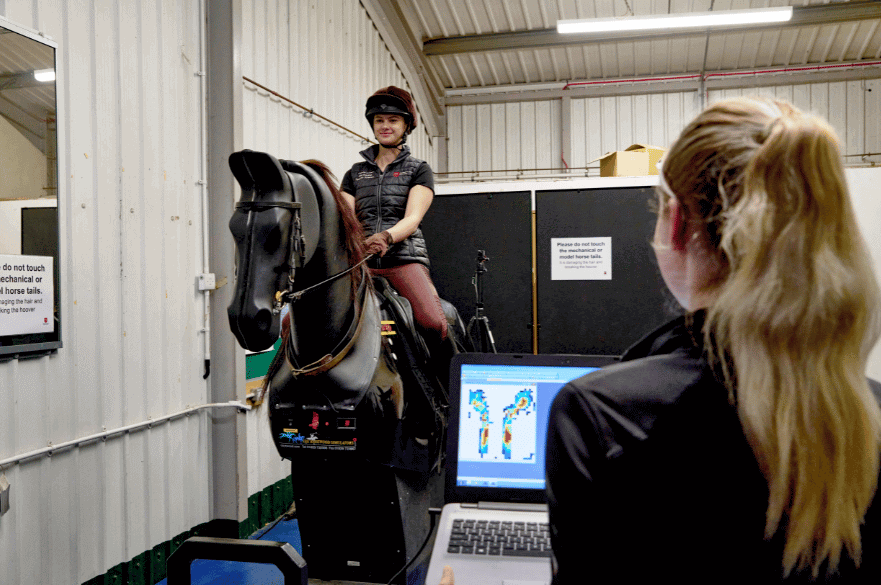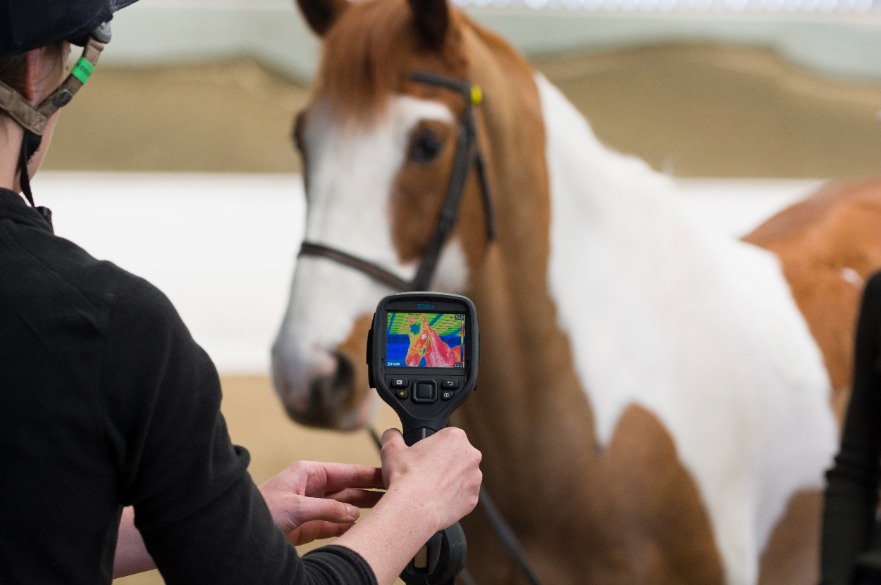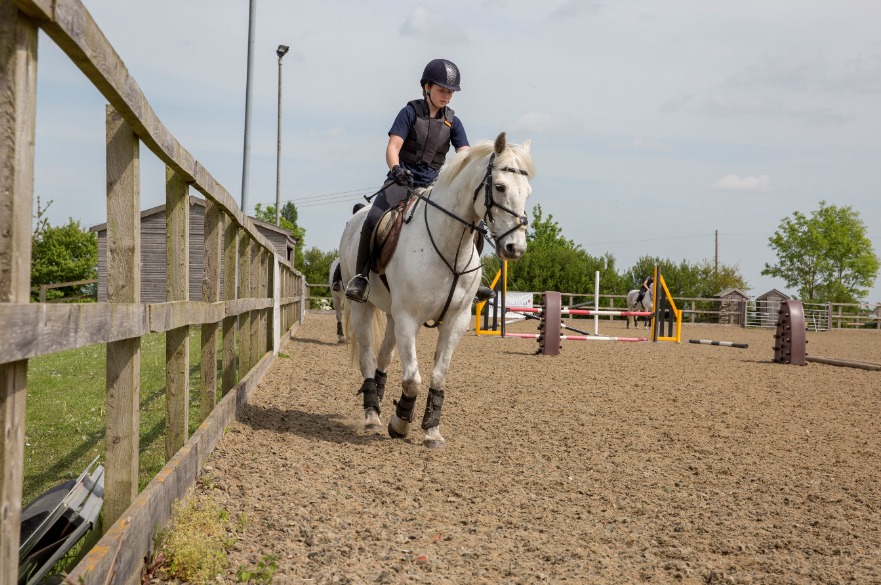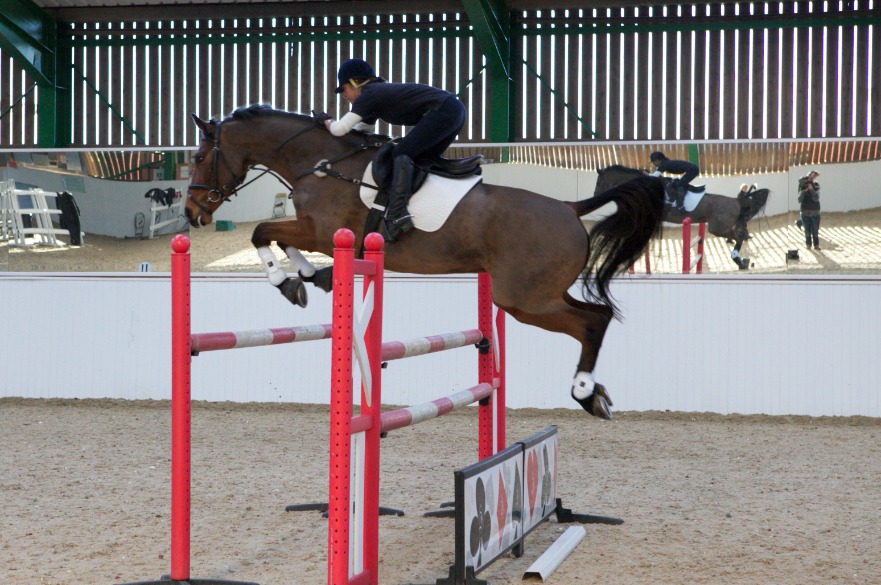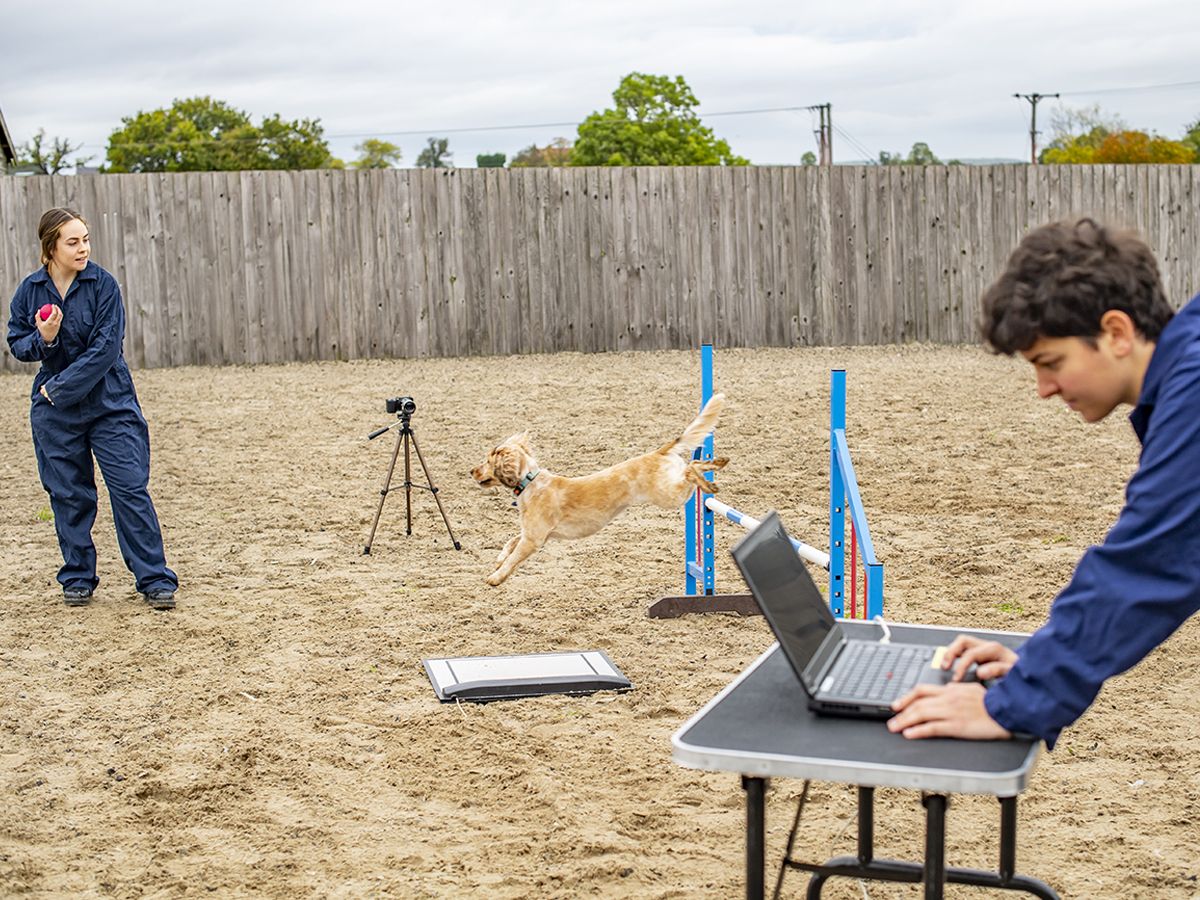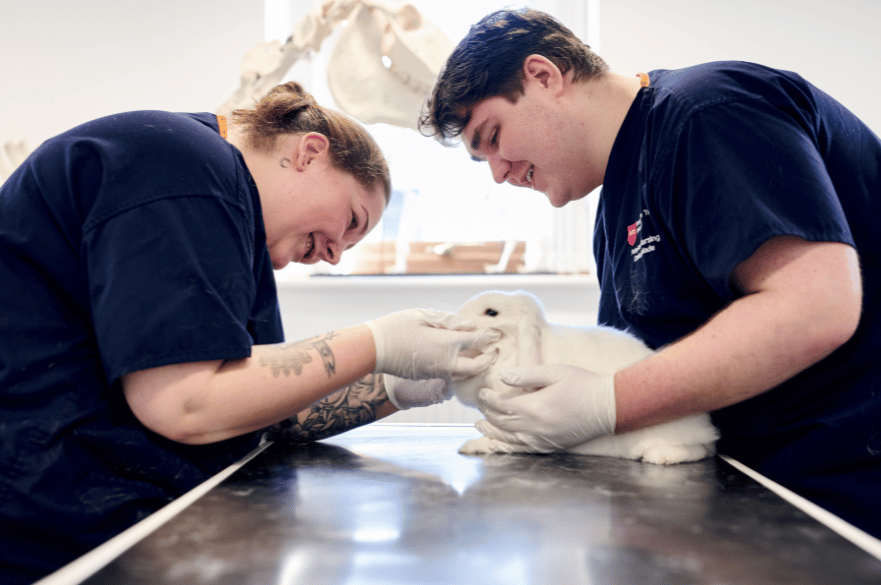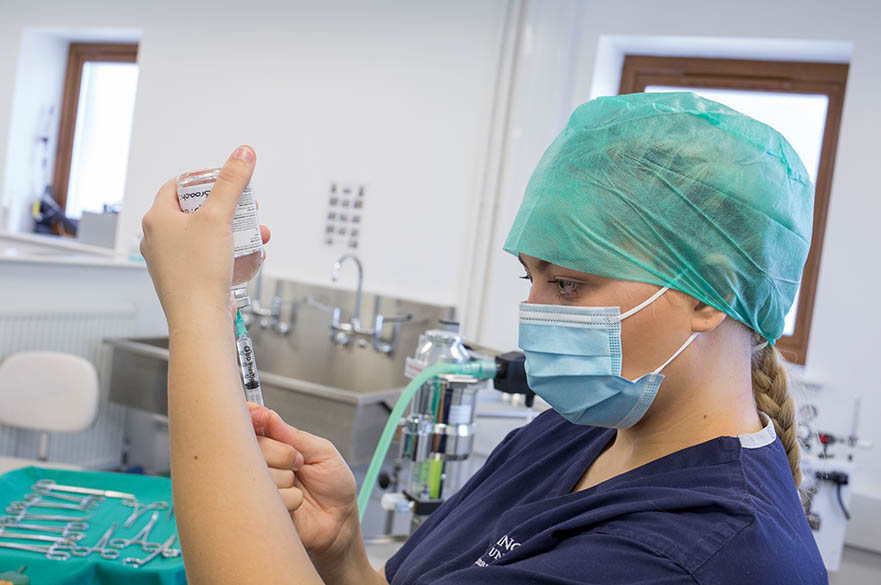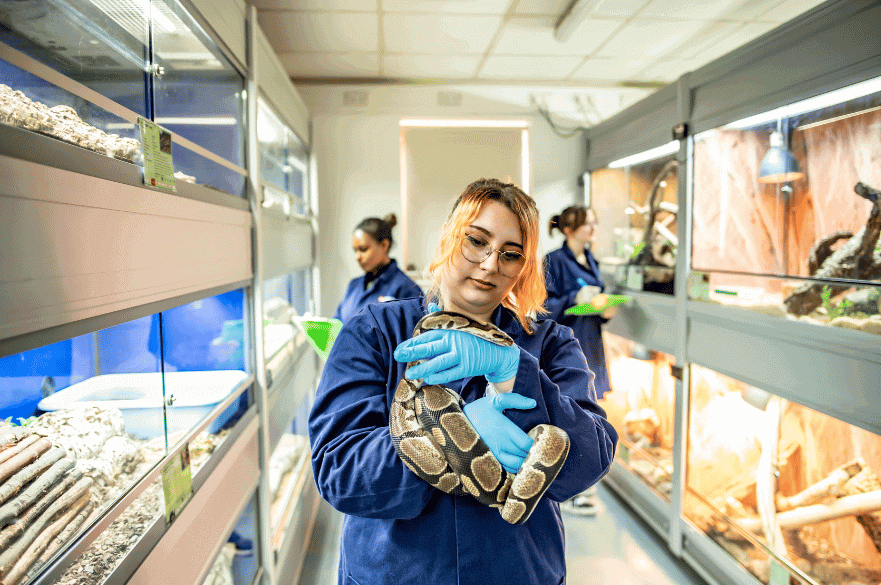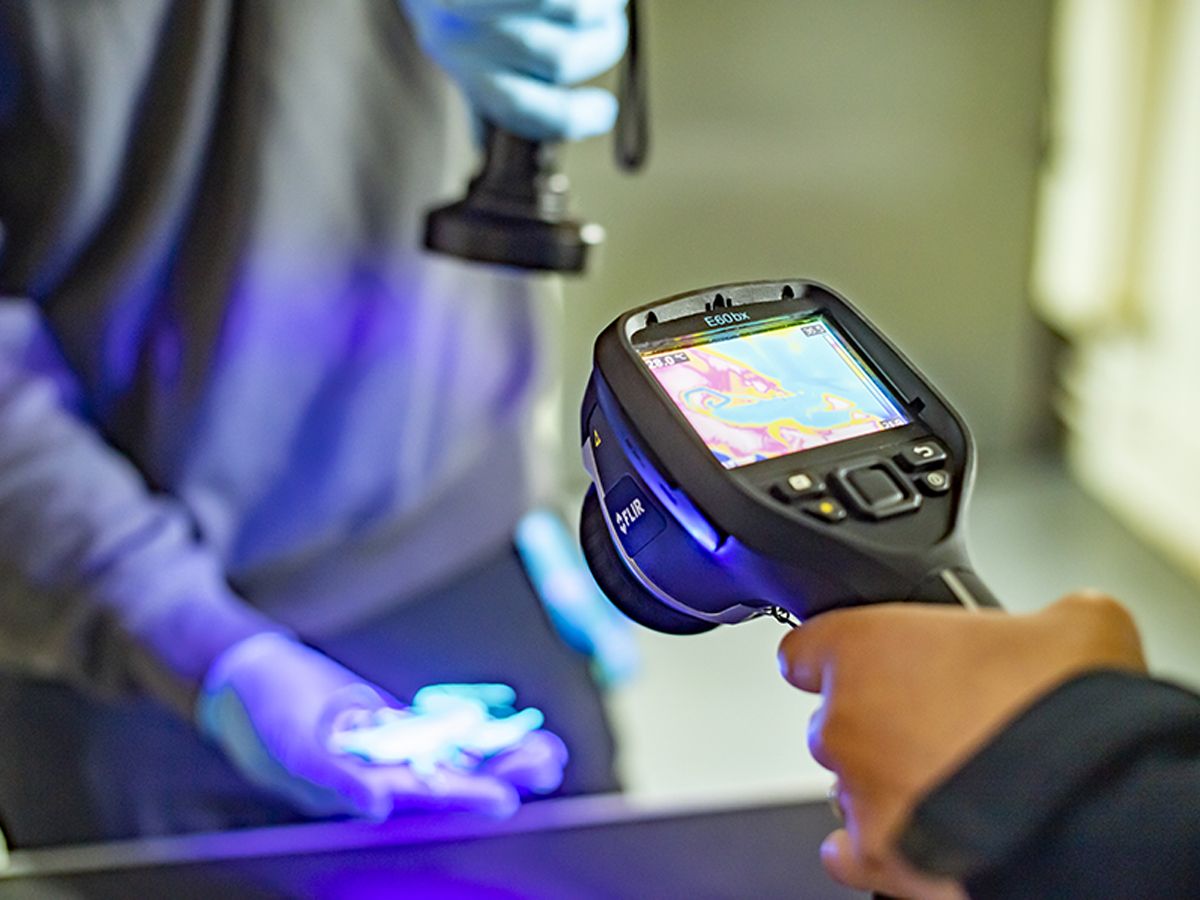Beat the Clearing queue
About this course
Please note that for 2026 entry onwards, this course will have the title BSc (Hons) Equine Science.
This course will give you a sound knowledge and understanding of the physiological principles of equine sports science, and enable you to relate them to different equestrian disciplines. It is specifically designed for students wishing to further their knowledge of the science behind the production, management and training of performance horses, and will develop your practical application of key scientific principles.
You'll be based at our Brackenhurst Campus where you'll benefit from our extensive Equestrian Centre. Throughout the course you'll use the centre to gain the practical and research skills needed for careers in the equine industry. We also offer student livery at the centre.
We also offer BSc (Hons) Equine Sports Science (with foundation year). Our integrated foundation degrees offer a unique gateway to our BSc courses for those who currently don't meet the degree-level entry criteria.
What you’ll study
Your study will centre on the major scientific themes of performance, nutrition, veterinary science, reproduction, and exercise physiology. You’ll explore the specialist areas of biomechanics and rider performance, as well as looking at how equine performance is affected by behaviour, welfare, health, injury and training.
The course complements study towards the internationally recognised British Horse Society (BHS) examinations and United Kingdom Coaching Certificate (UKCC).
Mammalian Anatomy and Physiology (20 credits)
Study the fundamental biological systems of mammals, and how these work together to maintain homeostasis.
Equine Nutrition (20 credits)
Learn how to apply the fundamental science of nutrition to equine feeding practices. Consider how discipline and sustainability of food sources influence nutritional management around the world.
Academic, Research and Professional Skills (20 credits)
Develop the practical, technical and communication skills required for the application of science to the equestrian industry.
Equine Behaviour and Welfare (20 credits)
Explore the roles that evolution and domestication have played in the development of innate and learned equine behaviour. Assess the consequences of a variety of current approaches to horse management on behaviour and welfare.
Science of Equitation (20 credits)
Investigate and apply the science behind the riding and training of horses, whilst developing the horsemanship skills required by industry.
Equine Management and Health (20 credits)
Study the veterinary science of horse health, and practically apply these principles to the management of the horse.
Applied Exercise Physiology (20 credits)
Investigate the physiological responses to exercise and training in the equine and human athlete, developing your understanding of the demands of equestrian sports.
Nutrition for Health and Performance (20 credits)
Explore the effect of nutrition on the health and performance of the sports horse, and how this can be managed.
Sports Injury (20 credits)
Develop a detailed understanding of the common injuries affecting sports horses, and the diagnosis, repair and healing of musculoskeletal tissues.
Introduction to Research (20 credits)
Explore the principles of research methods in biological sciences, focusing on data collection, analysis, and interpretation. You'll look at experimental design, literature evaluation and hypothesis testing, preparing you for undertaking independent research as part of your final year dissertation.
Training and Cognition (20 credits)
Discuss the various approaches to horse management and training and the biological basis of learning. You’ll also look at the neural adaptations that occur in relation to different types of learning and memory.
Reproduction, Breeding and Genetics (20 credits)
Study the physiological basis of equine reproduction, and evaluate the veterinary and stud management practices and technologies used to support the selection and breeding of performance horses.
This is a placement year for students on the sandwich course.
Optimising Performance (20 credits)
Evaluate established and emerging technologies and training techniques in order to take a multidisciplinary approach to sustainably optimising the performance of both the equine and human athlete.
The Sustainable Equine (20 credits)
Recognise and explain developments in research that influence emerging advances for sustainability in equids. You’ll also critically evaluate current international issues relating to sustainability in the equine industry.
Equine Disease and Diagnostics (20 credits)
Understand equine diseases in regional and global context, and develop practical ability in laboratory and non-laboratory procedures used in industry and veterinary science.
Applied Science Communications (20 credits)
Develop an appreciation of knowledge exchange and science communication within the context of applied equine science. You'll develop key graduate skills, including planning, evaluating and presenting data, via team based projects that meet a real-life brief provided by industry.
Dissertation (40 credits)
Carry out an original investigation into a topic area of your choice – plan, execute and analyse your project, demonstrating critical independent thought and key project management skills.
We regularly review and update our course content based on student and employer feedback, ensuring that all of our courses remain current and relevant. This may result in changes to module content or module availability in future years.
Don’t just take our word for it, hear from our students themselves
Student Work
Video Gallery
How you're taught
You’ll learn through a combination of lectures, seminars, group discussion and practical work. Throughout the course, you’ll also hear from external industry professionals through guest lectures and demonstrations. You'll also get the opportunity to take part in field trips to a range of equestrian and research establishments.
You will be assessed via written exams, written coursework, individual and group research projects and presentations. Additionally, practical skills are assessed via log books and portfolios.
A placement year may be taken between year 2 and year 3 of study.
Please note that field trip locations may vary and are subject to availability and change.
Careers and employability
Your future career
Graduates from this course are well-placed to take up a variety of careers within the equine sports industry, in nutrition, veterinary-related, the racing industry and equine charities.
90% of our BSc (Hons) Equine Sports Science graduates are in work or further study within 15 months of finishing their degrees
(of those available for work or study, latest Graduate Outcomes Survey 2021/22).
Our graduates work for companies such as:
- the British Equestrian Trade Association (BETA)
- The Jockey Club
- Newmarket Equine Hospital
Some have also gone on to secure places on the prestigious British Horse Racing Authority Graduate Development Programme. You could also progress on to postgraduate study.
Excellent placement opportunities
You will have the option to take a year's placement in industry.
Why undertake a placement?
- You will gain vital experience in a vocational position.
- It will boost your CV and build useful contacts for your future career.
- There are some exciting and challenging opportunities available within organisations such as Kentucky Equine Research, and Sydney, Edinburgh and Liverpool Universities.
- You will also have the opportunity to carry out research for your final year dissertation.
- Your placement opportunity may lead to a supplementary Certificate or Diploma in Professional Studies.
Students have gained valuable experience through recent placements such as:
- Australian Equine Behaviour Centre (Andrew McLean)
- Bellerive Stud, Australia
- Bennett Equine Sport Rehabilitation
- Fittocks Stud Newmarket
- Hartstone Equestrian Ltd
- Pakiri Beach Horse Riding, New Zealand
Work-like experience projects
You will also benefit from work-like experience opportunities embedded into your course, allowing you to engage directly with industry and develop essential professional skills, knowledge and attributes for future career success. Recently, our Equine Sports Science students completed a work-like project for the British Horse Society to update advisory literature for over 150,000 members.
NTU Enterprise
You'll also have the opportunity to turn your ideas into a viable business with help from NTU Enterprise, NTU's purpose-built Centre for Entrepreneurship and Enterprise, a support centre to help students create, develop and grow their own businesses.
Campus and facilities
As a dedicated home for our animal, rural and environmental science courses, the Brackenhurst Campus has a character all of its own. From the population of almost 2,000 students and staff to the animals themselves — cats and cattle, sheep and horses — it’s all about community. Relax with a coffee in the Orangery; kick back with your coursemates in the Brack Bar; enjoy the peace and quiet of our Victorian walled garden or Eco-Library; grab a pal and wander through 500 acres of stunning countryside.
Study on an equine course at Brackenhurst and you'll have access to extensive and unique facilities which are also used by various organisations including local pony clubs and the Great Britain eventing team (senior and junior).
Students benefit from the equestrian centre by organising their own competitions, taking part in significant research and developing their own coaching skills with other students.
The centre is a British Horse Society (BHS) approved training and livery establishment and also holds a full local authority riding school licence.
Facilities include:
- international-size indoor and outdoor riding arenas
- a horse walker
- a round pen
- crew yards
- a 40 x 20 research arena surrounded by a 7-foot fence to allow loose schooling
- observation holes in the fence, allowing you to observe horses from outside the arena.
Our horses
There are approximately 30 horses at the Equestrian Centre, including school masters, competition horses, and youngsters. The horses are available for:
- riding instruction
- coaching
- stable management
- research.
Student livery
We offer a limited DIY student livery.
Our Brackenhurst Campus sits on the doorstep of Southwell: a picture-perfect market town filled with rustic pubs, cosy cafés, and boutique shops. A little further afield, and served by reliable buses that run late into the night, you’ve got Nottingham — one of Britain’s top 10 student cities, and one of Europe’s top 25. It’s stuffed with history, culture, and well-kept secrets to discover at your leisure: enjoy lush green spaces, galleries, hidden cinemas and vintage shopping by day, and an acclaimed food, drink and social scene by night.
Entry requirements
UK students
Standard offer: 112 UCAS Tariff points from up to four qualifications, including an A-level Science subject or equivalent.
Contextual offer: 104 UCAS Tariff points from up to four qualifications, including an A-level Science subject or equivalent.
For this course we accept the following Science subjects: Biology, Chemistry, Physics and Sports Science / Physical Education. We also consider science modules as part of BTECs and other qualifications.
To find out what qualifications have tariff points, please use our tariff calculator.
Additional requirements for UK students
Access to Higher Education courses
If you’re aged 19+ and don’t have the qualifications to meet the entry criteria, you can study an Access to HE course right here at NTU. These one-year courses are designed specifically as an alternative route to university.
Contextual offers
If you don’t quite meet our entry requirements, we might be able to make you a lower offer based on a range of factors, including your background (such as where you live and the school or college you attended), your experiences and your individual circumstances (you may have been in care, for example). This is called a contextual offer, and we get data from UCAS to help make these decisions. We do this because we believe everyone with the potential to succeed at NTU should have the opportunity to do so, no matter what barriers you may face.
Meeting our entry requirements
Hundreds of qualifications in the UK have UCAS Tariff points attached to specific grades, including A-levels, BTECs, T Levels and many more. You can use your grades and points from up to four different qualifications to meet our criteria. Enter your predicted or achieved grades into our Tariff calculator to find out how many points your qualifications are worth.
Other qualifications and experience
NTU welcomes applications from students with non-standard qualifications and learning backgrounds, either for year one entry or for advanced standing beyond the start of a course into year 2 or beyond.
We consider study and/or credit achieved from a similar course at another institution (otherwise known as credit transfer), vocational and professional qualifications, and broader work or life experience.
Our Recognition of Prior Learning and Credit Transfer Policy outlines the process and options available for this route. If you wish to apply via Recognition of Prior Learning, please contact the central Admissions and Enquiries Team who will be able to support you through the process.
Getting in touch
If you need more help or information, get in touch through our enquiry form.
International students
Academic entry requirements: 112 UCAS Tariff points from up to four qualifications, including an A-level Science subject or equivalent.
For this course we accept the following Science subjects: Biology, Chemistry, Physics and Sports Science / Physical Education. We also consider science modules as part of BTECs and other qualifications.
We accept equivalent qualifications from all over the world. Please check your international entry requirements by country.
English language requirements: See our English language requirements page for requirements for your subject and information on alternative tests and Pre-sessional English.
Additional requirements for international students
If you need help achieving the academic entry requirements, we offer a Foundation preparation course for this degree. The course is offered through our partner Nottingham Trent International College (NTIC) based on our City campus.
English language requirements
View our English language requirements for all courses, including alternative English language tests and country qualifications accepted by the University.
If you need help achieving the language requirements, we offer a Pre-Sessional English for Academic Purposes course on our City campus which is an intensive preparation course for academic study at NTU.
Other qualifications and experience
If you have the right level of qualifications, you may be able to start your Bachelors degree at NTU in year 2 or year 3. This is called ‘advanced standing’ entry and is decided on a case-by case basis after our assessment of your qualifications and experience.
You can view our Recognition of Prior Learning and Credit Transfer Policy which outlines the process and options available, such as recognising experiential learning and credit transfer.
Sign up for emails
Sign up to receive regular emails from the International Office. You'll hear about our news, scholarships and any upcoming events in your country with our expert regional teams.
Getting in touch
If you need advice about studying at NTU as an international student or how to apply, our international webpages are a great place to start. If you have any questions about your study options, your international qualifications, experience, grades or other results, please get in touch through our enquiry form. Our international teams are highly experienced in answering queries from students all over the world.
Policies
We strive to make our admissions procedures as fair and clear as possible. To find out more about how we make offers, visit our admissions policies page.
How to apply
Ready to join us? Then apply as soon as you can. Just click the Apply button at the top of the page and follow the instructions for applying. Make sure you check the entry requirements above carefully before you do.
Writing your application and personal statement
Be honest, thorough and persuasive in your application. Remember, we can only make a decision based on what you tell us. So include all of your qualifications and grades, including resits or predicted grades.
Your personal statement is a really important part of your application. It’s your chance to convince us why we should offer you a place! You’ve got 4,000 characters to impress us. Make sure you use them to show how your skills and qualities are relevant to the course(s) you’re applying for. For more hints and tips, take a look at our page on how to write a good personal statement.
Keeping up-to-date
After you’ve applied, we’ll be sending you important emails throughout the application process so check your emails regularly, including your junk mail folder.
You can get more information and advice about applying to NTU on our Your Application page. Good luck with your application!
Getting in touch
If you need any more help or information, please contact us at Ask NTU or call on +44 (0)115 848 4200.
You can apply for this course through UCAS. If you are not applying to any other UK universities, you can apply directly to us on our NTU applicant portal.
Application advice
Apply early so that you have enough time to prepare – processing times for Student visas can vary, for example. After you've applied, we'll be sending you important emails throughout the application process – so check your emails regularly, including your junk mail folder.
Writing your personal statement
Be honest, thorough, and persuasive – we can only make a decision about your application based on what you tell us:
Advice on writing a good personal statement
Would you like some advice on your study plans?
Our international teams are highly experienced in answering queries from students all over the world. We also have members of staff based in Vietnam, China, India and Nigeria and work with a worldwide network of education counsellors.
- Complete this simple form to keep in touch with the International Office.
The University's commitment to delivering the educational services advertised.
